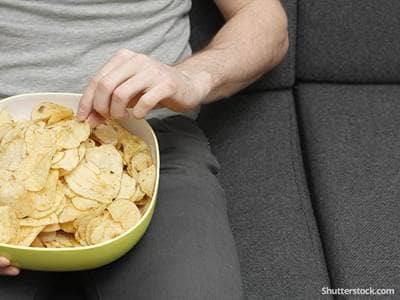
You plan on eating just a few chips. And well, what’s just a few more…and more… and before you know it, the bag is empty and you are still feeling a little munchy. Did you know that there are certain foods that, the more you eat, the hungrier you feel? Pay attention if you plan to indulge in these appetite-boosting foods.
Salted Snacks
“Bet you can’t eat just one” is never more true when it comes to salt. A study by University of Florida College of Medicine & McKnight Brain Institute, Gainesville, suggests that salted food acts like a mild opiate, which drives overeating and weight gain. “Salted food may be an addictive substance that stimulates the brain’s reward and pleasure center. Salted food preference, urge, craving, and hunger may be manifestations of opiate withdrawal,” concluded lead author James A. Cocores, MD. In addition, salt makes you thirsty, which may lead you drink beverages that aren’t good for you like sugary sodas and juice, and alcohol.
Hunger tamer: If you can’t eat just one, then don’t eat that one that will get your started! Don’t have it in the house and when out, don’t sit at bars with the salted snack bowls out. “If you do eat salted foods, pair the snack with a satisfying protein to cut cravings or choose the right beverage,” says Bonnie Taub-Dix, MA, RDN, CDN, owner, BetterThanDieting.com, and author of Read It Before You Eat It.
Artificial Sweeteners
A review of studies on sweeteners by Yale University found that sweet taste, whether from sugar or artificial sweeteners, increases appetite but that artificial sweeteners do not activate the food reward pathways in the same way. Real sugars register in the brain as a reward. Artificial ones do not, which means your hunger isn’t satisfied.
Hunger tamer: Don’t take this as permission to go nuts on real sugars. They may be more satiating, but they still aren’t particularly healthful. But if you must get that spoonful of sugar, Taub-Dix encourages use of natural sugars such as agave syrup, monk fruit or stevia.
White Bread and Pasta
Refined flour is devoid of nutrients, so you have to eat more to get that satiated feeling, says Taub-Dix. White bread and pasta have a high glycemic index, meaning they are quickly digested and converted to sugar, causing your body to release a burst of insulin. A review of studies published in the journal Health Psychology found that elevations of insulin corresponded with "increased hunger, heightened perceived pleasantness of sweet taste, and increased food intake."
Hunger tamer: You are better off going with whole grains, which provide more fiber and nutrients, making them more filling, Taub-Dix adds. If you want the white bread and pasta, combine it with some kind of protein such as cheese, beans or poultry, to promote satiation.
Alcohol
Alcoholic drinks are very caloric, so why do you end up famished after drinking them? One problem is that alcohol decreases your defenses. A study published in Health Psychology noted after drinking liquor, study participants lost their inhibitions, and ate more than they had planned.
Hunger tamer: Try sparkling water or go for a wine spritzer to cut the alcohol content. “If you do drink, make sure you don’t eat on an empty stomach. You’ll get drunk and lose control more quickly,” says Taub-Dix.
MSG (monosodium glutamate)
A flavor-enhancer best known as a Chinese food additive, MSG is also found in other foods you’d never suspect such as chicken nuggets, processed meats, canned soups and more. A study published in Obesity found that eating MSG may be associated with an increased risk of being overweight, independent of physical activity and total energy intake. Why? Another study, published in The European Journal of Clinical Nutrition, posits that MSG actually damages the hypothalamus regulation of appetite.
Hunger tamer: Ask at restaurants whether there is MSG in the food. Also, check ingredient labels on packaged foods. MSG may be listed as hydrolyzed protein, autolyzed yeast, glutamic acid and yeast extract, according to the FDA.
Processed foods
Cakes, chips, pizza, chocolate. What do these have in common besides the fact that they are nummynummynummy? They often have a high glycemic load, which causes your blood sugar to spike and then crash. This crash makes people crave foods more intensely, especially high sugar and fat foods. “Also, highly processed foods appear to more intensely activate the reward centers of our brain than more natural foods, like nuts and carrots. Our brain remembers those pleasurable feelings and when we see cues that remind us of these foods it can trigger cravings,” says Ashley Gearhardt, Ph.D., Assistant Professor, University of Michigan.
Hunger tamer: “We suggest that people work on identifying foods that are less processed, but that they really like," says Dr. Gearhardt. "For example, mango with Greek yogurt or carrots and hummus. Then make sure you are eating regular meals and one or two snacks composed of these high-quality foods that you enjoy. You will feel less deprived and we know that when people go long periods of time without eating it sets them up for intense cravings." She adds that you should spend some time identifying what your personal triggers are. This can be external triggers (e.g., certain times of day, walking past a bakery, cookies that a friend made) or internal triggers (e.g., boredom, sadness, happiness, fatigue). Try to minimize your exposure to external triggers when possible and have healthy snacks on hand as a substitute.
Juice
There is a lot of sugar in juice, so again, your blood sugar level goes way up and the crashes, leaving you hungrier than when you started.
Hunger tamer: Eat the fruit whole so you get the nutrients and fiber, which is more filling, says Taub-Dix.
The Bottomline
Overall, be aware of your cravings. Think before you eat. What are you in the mood for? Don’t just grab something. Are you in the mood for something hot or cold, crunchy or creamy? Don’t just stand in front of the fridge tasting things. Calories can really add up that way without you feeling like you had a satisfying meal. “Instead of looking at these foods singularly, you are better off having a combination of protein, carbohydrate and healthy fat, so you will feel satisfied for a longer time. And be sure you don’t skip meals. You’re not leaving yourself open to being hungry when you might not have a decent snack available to you,” says Taub-Dix.

